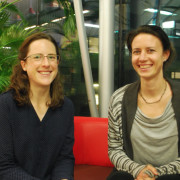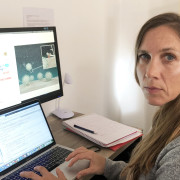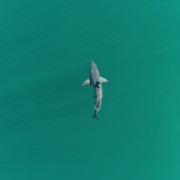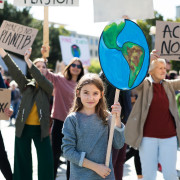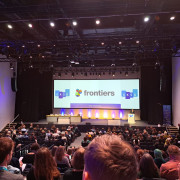- Science News
- Frontiers news
- Early Career Insights: When theory meets practice
Early Career Insights: When theory meets practice
Kyle Gustafson and Kyle Douglass are two physicists doing their postdocs at EPFL…in Biology.
Douglass did his PhD in Optics at the University of Central Florida, Orlando, working in the fields of light scattering, biophotonics, and optical sensing for soft matter characterization and cell biology. Now he is doing his first postdoc in the Laboratory of Experimental Biophysics at EPFL, where he is using new microscopy techniques, building his own super-resolution fluorescence microscope, to understand the structure of DNA inside the cell nucleus. He is using his background in experimental physics and working closely with biologists, to perform his research focused on the physical mechanisms describing the compaction of chromatin, the associated DNA proteins.
Gustafson did his PhD in theoretical plasma physics at the University of Maryland. He did a first postdoc in plasma Physics at EPFL before switching into biological physics and systems biology. In his last postdoctoral period at EPFL, he studied new models for the description of stochastic phenomena in gene regulation networks. He is now moving to the Institute for Disease Modeling near Seattle, to continue with his research, now focused on epidemiology and spread of diseases.
Both are working on Biophysics, but while Gustafson followed a theoretical path to research, Douglass followed a practical one. Two sides of the same laws of Physics? Are they really different?

Interviewing Kyle Gustafson (left) and Kyle Douglass (right) at the EPFL Rolex Center
How do you describe your usual day?
KG: My day starts by going to the office, check the results of the simulations that have been running the night before, analyze the results and think about the simulations to run next. Then I probably have a meeting and after lunch I start running more simulations for the next day.
KD: The first thing I do everyday is to spend one hour at home, really early, doing serious thinking while having my first coffee. It is the most productive moment for me, before going to the lab, usually busy and noisy. Once at the office, I check emails and talk to people, and usually spend the rest of the time in the lab, building microscopes, setting experiments or writing code to control them.
KG: I am impressed by this early hour. It sounds really nice, because, although interactions with other people are important, it is easy to get distracted at the office.
What is the part that you enjoy the most at work? And the one you find the most difficult?
KD: The best part for me is every hour with coffee! I enjoy thinking collectively in group meetings, but what I really love is when I spend time and in the lab working on something with my hands. The most difficult moment is when I am really excited about an idea and want to work on it, but I have to reply to emails or do office work instead.
KG: The best part for me is the beginning of the day, when I first sit down in the morning and I have new results to look at. And the worst part is the end of the day, since sometimes it can be very frustrated if you are stuck on a problem.
Which skill do you think is the most important for research?
KG: Persistence, and focus. Intuition is the ground floor; you wouldn’t be a postdoc without ideas or intuition. But to become a lab leader you need to be persistent. Sometimes you have to try things, and keep trying even if they don’t work, and learn from them that maybe the questions you are asking are wrong.
KD: Focus. There are always other interesting things you could do, but you need to realize that they are not going to help you in your career. It is also important to be able to pick up skills quickly: as a postdoc you need to be good at writing, making graphics, managing budget, communicating science…
And which skill do you think you have improved the most through your research?
KG: Switching to this multidisciplinary environment help me improving on communicating science, like explaining what I was doing before, plasma physics, to biologists now.
KD: By working with biologists I have improved my communication skills as well, explaining what I am doing to non specialists. It also made me appreciate fundamental differences in the philosophy of science done by physicists and biologists. In Physics you can explain everything with a set of fundamental laws, which are equally valid here and in Mars. But for Biology, the context and interaction with the environment, the systems, determine how everything unfolds.
KG: And the context is so specific and detailed every time that there is no general rule.
Do you work directly with your boss and do you supervise students?
KG: We don’t really have defined supervising relationships, and at this stage you need to learn how to be a group leader, who has very little time for each person. Anyhow, it would be good if the postdocs could get credit as supervisors of students officially, when they do so.
KD: I am really independent. A postdoc is a transition stage: you have to learn to manage yourself and sometimes ask for advice, sometimes give advice.
How long does it take for you to complete a project, since its first conception until you publish the results?
KG: I would say that a year is a reasonable minimum from start to finish of a project. But it of course depends: if you need to set up an experiment and get new data it will take longer and will involve more people. The part in which I spend more time is the loop of writing code, running simulations, checking simulations, re-writing code…
KD: It took two and a half years to complete my previous project. Sometimes it is really slow and, depending if the system is ready or not when you arrive, the duration of a postdoc might give the possibility to finish only one project.
KG: Here there is a difference between us. If I make a mistake or a bad assumption in my numerical model, I will probably know it the next day, and change it. But if you are doing an experiment, especially if you use mice, it takes at least two months to realize and repeat the study if you make a mistake.
KD: Exactly. You often have bad assumptions in both theorists and experimentalists’ work, but you pay more for them when doing experiments. For this reason you have to think really carefully before starting a new experiment.
Would you enjoy having an experience “on the other side”, being an experimental physicist instead of theoretical or vice versa?
KG: I have done experiments during my undergraduate studies as physicist. But I don’t think it would be useful for me now. I know what it takes, but I would not be efficient at doing it.
KD: I agree, I would enjoy it but it wouldn’t be useful for me. It is good to have a big curiosity and there is lots of interesting science you could learn about, but this would not drive you forward in your career. At some point you need to focus, choose and get better at doing one thing.
Wishing them to be the best ones they can be at what they are doing, I would like to say thank you for their time and goodbye to these two biophysicists, and to 2015. Keep learning, keep trying and keep asking, those are my wishes for them and for all of you in the next year.

